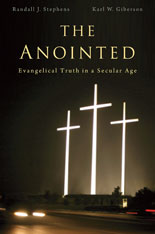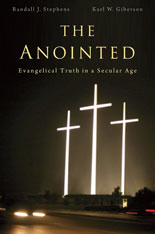 Randall J. Stephens and Karl W. Giberson, The Anointed: Evangelical Truth in a Secular Age (Cambridge, MA: Harvard, 2011). $29.95, 384 pages.
Randall J. Stephens and Karl W. Giberson, The Anointed: Evangelical Truth in a Secular Age (Cambridge, MA: Harvard, 2011). $29.95, 384 pages.
As I read The Anointed, my feelings of ambivalence toward it increased.
On the one hand, I agree with its indictment of evangelical anti-intellectualism. The fact that so many of my co-religionists take their scientific cues from Ken Ham rather than Francis Collins, their historical cues from David Barton rather than Mark Noll, and their eschatological cues from Hal Lindsey rather than George Eldon Ladd does not speak well of their good judgment. How Ham, Barton, and Lindsey (among others) become “the anointed”—that is, leading spokesmen both in and for our community—does not speak well for our leadership development pipeline, which too often emphasizes charisma over academic training, simplistic sloganeering over complex thought, and social withdrawal from than rather critical engagement with secular culture.
On the other hand, I am puzzled by the language and venue in which Randall Stephens and Karl Giberson have published their indictment. Both men are evangelical scholars, but throughout The Anointed, they speak of their fellow evangelicals in detached, third-person language. This gives the book an anthropologist-from-Mars feel. They explain common evangelical beliefs and practices, apparently on the assumption that their readers have never heard of them. And they published their indictment through Harvard University Press and, in abbreviated form, on the op-ed pages of The New York Times.
Both the language and the venue made me wonder who their intended readers are. If their intended readers are fellow evangelicals, both the language and the venue are strange choices. Why speak about “them” in detached, third-person language when they could speak about “us”? And aren’t there evangelical academic publishers who would be more than willing to publish this indictment? (I think immediately of Eerdmans, for example.) If their intended readers are secular in outlook, the language and venue make more sense. But if that is the case, why would they hand readers the rocks with which to stone their co-religionists?
As I read The Anointed with ambivalence, I couldn’t help but compare it to Mark Noll’s 1995 indictment of evangelical anti-intellectualism, The Scandal of the Evangelical Mind, which Noll described as “an epistle from a wounded lover.” Noll’s commitment to and admonition of the evangelical community were both clear. The language and publication venue of The Anointed confused me about Stephens’ and Giberson’s motivations.
Another point of ambivalence concerns the concept of authority that seems to underlie their book. This issue arises most clearly in chapters 1 and 3, where the relationship between biblical interpretation and scientific study arises. Chapter 1 opposes Ken Ham’s young Earth creationism to biological evolution. Chapter 3 opposes James Dobson’s stances on child discipline and same-sex marriage to social-science research on those topics. Stephens and Giberson clearly think that science trumps Ham’s and Dobson’s interpretations of the Bible. This makes perfect sense if Ham’s and Dobson’s interpretations are wrong, of course, but what if the interpretation is right?
Take the issue of same-sex marriage, for example. Stephens and Giberson approvingly cite the conclusions of David G. Myers, a Christian psychologist who thinks evangelicals should support same-sex marriage. But Myers’ support for that institution is open to challenge, not merely from anti-intellectual evangelicals, but from academically credentialed ones such as Stan Jones (psychology) and Robert Gagnon (theology). The most plausible interpretation of the relevant biblical passages, those scholars argue, prohibits homosexual behavior. If social science research normalizes homosexual behavior and supports same-sex marriage, what results is a rather clear-cut contradiction between biblical interpretation and scientific research. In that case, which of them prevails?
Or take the issue of corporal discipline of children. The most plausible interpretation of the relevant biblical passages indicates that the Bible permits spanking, even promotes it. But if social science research concludes that parental “aggression” promotes childhood “aggression,” then which authority prevails? The Bible or science?
I don’t believe that the Bible and scientific research need to conflict. They can be mutually illuminative. The Copernican Revolution, for example, exposed the flaws of geocentric interpretations of the Bible. It corrected, that is to say, human misinterpretation of divine words. Passages that seemed to indicate geocentricity—e.g., “the sun rose”—were better interpreted as expressing a phenomenological viewpoint rather than stating a scientific fact. Similarly, biblical commitments can expose illegitimate scientific authority. To conclude, as some New Atheists do, that science disproves God is bad metaphysics, not good physics.
Stephens and Giberson conclude the book with this statement: “Those leaders most skilled in appropriating both the spiritual authority of the Christian tradition and the secular authority of the present culture—whatever its changing epistemological priorities—will provide that intellectual authority and be anointed to lead.” It’s the “changing epistemological priorities” that worry me.
My guess is that non-evangelical readers of this review will scoff at my worry. That’s their right, but they’re not my concern. My fellow evangelicals are. For us, the faith-reason debate is a live one. But I’m not sure that The Anointed—despite my agreement with aspects of its indictment of evangelical anti-intellectualism—is the best guide for how to resolve this live debate among us.
P.S. If you found my review helpful, please vote “Yes” on my Amazon.com review page.

